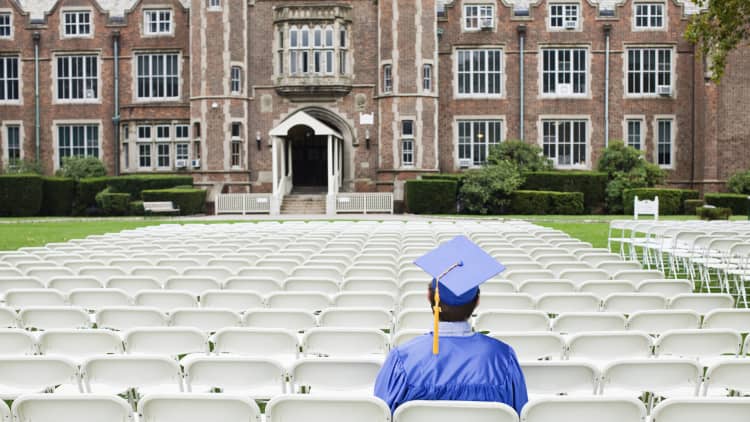On Saturday, President Donald Trump signed several executive actions aimed at addressing the financial impacts the coronavirus pandemic has had on the U.S. economy after Congress failed to pass a new stimulus package. Lawmakers from both parties called the series of executive orders "unconstitutional."
Trump also signed a memorandum ordering Secretary of Education Betsy DeVos to extend student loan relief policies included in the CARES Act that were scheduled to expire on September 30th, through the end of December.
The CARES Act, passed on March 27, paused federal student loan payments and temporarily set the federal student loan interest rate to 0%.
"Currently, many Americans remain unemployed due to the COVID-19 pandemic, and many more have accepted lower wages and reduced hours while States and localities continue to impose social distancing measures," wrote the president. "It is therefore appropriate to extend this policy until such time that the economy has stabilized, schools have re-opened, and the crisis brought on by the COVID-19 pandemic has subsided."
Financial experts such as Bola Sokunbi, Clever Girl Finance CEO and FAB AID board member say suspending federal student loan payments will serve as "much-needed relief" for roughly 40 million borrowers.
However, approximately 9 million borrowers who have private student loans will not get total relief under the new rule.
Trump's latest action "continues the payment pause and interest waiver on federal loans held by the U.S. Department of Education for three months. It is unclear whether the interest waiver will apply to all federal loans, or just subsidized loans," explains higher education expert Mark Kantrowitz. "The extension will be implemented as a modification of the economic hardship deferment, which waives interest on just subsidized loans. For similar reasons, the paused payments will probably not count toward Public Service Loan Forgiveness, but do count toward the 20 or 25-year forgiveness at the end of an income-driven repayment plan."
Indeed, Trump's student borrower relief policy is less expansive than what many Congressional Democrats and Republicans had sought, in part because it excludes the roughly 9 million federal student loan borrowers whose debt is held by private lenders or their colleges and because it does not count paused payment months towards the repayment time required for public servants utilizing the Public Service Loan Forgiveness program.
"We are heartened to see that the Trump administration has provided additional relief to some student loan borrowers by suspending student loan payments through December 31, however, more relief is needed," says Nancy Conneely, director of policy at AccessLex Institute, a legal education nonprofit. "The pandemic will not end in December when this payment suspension ends, and we are hopeful that Congress and the administration can come together on a relief package that provides more sustained support for student loan borrowers as they continue to weather the economic fallout of the pandemic."
Conneely continues, "We also urge the administration to count suspended payments toward Public Service Loan Forgiveness and income-driven repayment, as the CARES Act does. Counting suspended payments toward PSLF recognizes the vital work being done by our public servants, such as nurses, doctors and other essential workers, which is needed now more than ever. These Americans should not lose progress toward forgiveness due to circumstances outside of their control."
Student loan policy has become a point of contention among relief proposals. On May 15, the House of Representatives passed the HEROES Act, which would expand the pause on federal student loan repayment through September 2021 and would cancel up to $10,000 for some federal and private loan holders.
In contrast, on July 27, Senate Republicans introduced the HEALS Act which does not include significant relief for borrowers. Instead, the HEALS Act eliminates student loan repayment options and allows only those with no income to defer payments.
The Trump administration says the president gets his authority for his latest memorandum under the Higher Education Act, a logic some legal experts say could create precedence for broader unilateral student loan forgiveness in the future.
Don't miss:



